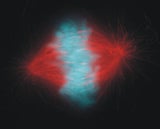Cell Structure and Function
 Research in cell structure and function seeks to determine mechanisms by which parts of cells undergo change and interact with one another in carrying out basic cellular functions. The field encompasses cell morphology, physiology, biochemistry, and molecular biology. The goals are to understand the organization and activities of cells at all levels, from the behavior of entire cells and cell organelles to relationships between their component molecules. A wide range of approaches is employed, including light and electron microscopy, electrophysiology, molecular genetics, and biochemical analysis. A number of rapidly developing areas are under investigation by members of the Cell and Molecular Biology group.
Research in cell structure and function seeks to determine mechanisms by which parts of cells undergo change and interact with one another in carrying out basic cellular functions. The field encompasses cell morphology, physiology, biochemistry, and molecular biology. The goals are to understand the organization and activities of cells at all levels, from the behavior of entire cells and cell organelles to relationships between their component molecules. A wide range of approaches is employed, including light and electron microscopy, electrophysiology, molecular genetics, and biochemical analysis. A number of rapidly developing areas are under investigation by members of the Cell and Molecular Biology group.
Mechanisms of cell motility, including movement of whole cells and of their parts, constitute an active area of investigation in cell biology. In recent years, there has been considerable progress in the structure and chemistry of microtubules, microfilaments, and membrane proteins. Research in these areas at the University of Virginia includes studies on the mechanism of chromosome movement during mitosis, of organelle tranport along microtubules and actin filaments, and on the behavior of flagella during cell motility.
Another important area of cell biology concerns the control of cell function by external signals. A major aspect of research at the University of Virginia relates to the function of cells involved in the circulatory systems, particularly the vascular smooth muscle and endothelial cells of the circulation. Techniques ranging from video microscopy to gene cloning are used to investigate the factors that control the circulation and growth of relevant cell types.
A source of information that is very important in determining the proper function, arrangement, and development of cells is provided by the extracellular matrix. This network of proteins and other macromolecules helps organize and inform cells of their locations, and provides guideposts for their migrations through an organism during embryogenesis and for wound healing. Several labs at the University of Virginia explore the extracellular matrix, its composition, and its effect on the development of cells and tissues.
Research into basic aspects of cell function address myriad topics, ranging from the mechanism of storage and secretion of proteins destined to be exported from the cell to the nature of sites that initiate chromosome replication. The diversity of experience and equipment available makes collaborative projects possible and facilitates interdisciplinary approaches to current projects.
Faculty in this area
Search Research Faculty Directory >
George S. Bloom, PhD
Alzheimer’s DiseaseJames E. Casanova, PhD
Role of Arf family GTPases in vesicular transport and cytoskeleton assembly.
Cell Biology of bacterial pathogenesis.
The innate immune response to bacterial infection.
J. David Castle, PhD
Regulation of Membrane Recycling and Protein Secretion
Gordon W. Laurie, PhD
Role of Prosecretory Mitogen ‘Lacritin’ in Epithelial Homeostasis, Secretion and Innate Defense
Bryce M. Paschal, PhD
Nuclear Transport, Signaling, and Cancer
Lucy F. Pemberton, PhD
Nuclear Transport in Chromatin Assembly and Transcriptional Regulation
Structure, Function, and Regulation of Cytoplasmic Dynein: Its Role in Intracellular Microtubule-based Transport, Membrane Bounded Organelle Trafficking, Axonal Transport and Mitosis
Dorothy A. Schafer, PhD
Mechanisms of actin assembly during cell migration and membrane traffic
Avril V. Somlyo, PhD
Novel signal transduction pathways in smooth muscles that regulate contractility and impact diseases of the vasculature, airway and gastrointestinal tract.
P. Todd Stukenberg, PhD
Mechanisms of chromosome segregation, cytokinesis and generation of aneuploidy
Ann E. Sutherland, PhD
Cell Matrix Interactions In Mouse Development
Judith M. White, PhD
Virus Entry into Cells, Virus-Cell Fusion, Entry Inhibitors
Mary K. Worden, PhD
Hormonal Modulation of Neuromuscular Function
